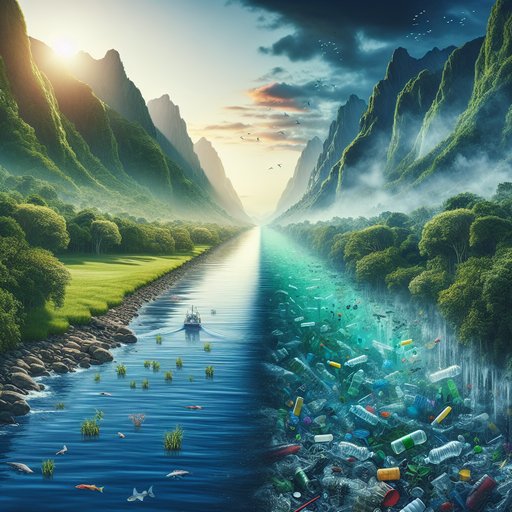
In the latest Weekly Climate and Energy News Roundup, the pressing issues of our environmental crises are laid bare. From the ongoing debate over deep-sea mining to the relentless exploitation of public lands, these headlines reflect a broader cultural malaise: our inability to see beyond immediate gain. Rivers, once the lifeblood of civilizations and carriers of myths and legends, are now conduits for microplastics that infiltrate ecosystems and threaten the unborn. This transformation from myth-laden waterways to polluted channels underscores a profound cultural shift. We have become a society that disposes of everything, blind to the fact that in doing so, we dispose of ourselves. Yet, amid the disheartening news, there are glimmers of hope. Europe’s revival of deposit-return schemes for plastics hints at a possible cultural and ecological detox. If we can scale these initiatives globally, we might allow rivers—and ourselves—to tell cleaner, more sustainable stories again.
Rivers have always been more than just bodies of water; they have been the veins of myth and culture. In ancient times, rivers were seen as sacred, their flows symbolizing the lifeblood of the earth itself. Human cultures flourished alongside these waterways, weaving them into their stories and rituals. However, as the Weekly Climate and Energy News Roundup reminds us, our modern relationship with rivers has degenerated into one of exploitation and neglect.
The remnants of our disposable culture now flow through these waterways, ferrying microplastics to every corner of the planet, including into the bodies of unborn children [1]. The issue of deep-sea mining, highlighted in the recent international discussions, exemplifies our tendency to prioritize short-term economic gains over long-term ecological health. Despite calls for a moratorium from various environmental groups, governments have failed to pause these activities, showcasing a profound disconnect between policy and planetary stewardship [2][3]. This relentless pursuit of resources echoes the broader disposability mindset that dominates much of our industrial activity—a mindset that views natural resources as infinite and expendable.
Our rivers, once carriers of myths and legends, now tell a different story—one of environmental degradation and cultural loss. The microplastics they carry are not just pollutants; they are symbols of a broader cultural failure. We have become trapped in what ethnographies describe as 'sachet economies,' where the convenience of single-use packaging has ensnared the economically disadvantaged in a cycle of plastic dependence [4]. These economies prioritize convenience over sustainability, contributing to the global plastic crisis that now taints even the most remote waterways.
Yet, there is hope on the horizon. The revival of deposit-return schemes in Europe represents a meaningful step towards systemic change. These schemes incentivize recycling by placing a small deposit on beverage containers, refundable upon return. This simple yet effective system has been shown to significantly reduce plastic waste and could serve as a model for global implementation.
If scaled effectively, such initiatives could mitigate the plastic deluge entering our rivers, turning the tide towards cleaner, healthier waterways [1]. Moreover, the concept of granting legal personhood to natural entities—rivers, forests, and ecosystems—offers a radical reimagining of our relationship with the natural world. By recognizing the intrinsic rights of nature, we can begin to dismantle the anthropocentric frameworks that have led us to this point. This shift in perspective aligns with indigenous worldviews that see humans as part of a larger ecological community, rather than its dominator.
If we can integrate these perspectives into mainstream legal and economic systems, we may yet restore balance to our relationship with the planet. The challenges we face are daunting, but they are not insurmountable. Cultural change is possible, and history is replete with examples of societies that have transformed their practices in response to ecological imperatives. By embracing deposit-return schemes and the legal recognition of nature’s rights, we can begin to detoxify our waterways and our cultures.
This requires not only policy changes but a fundamental shift in our values and narratives. We must move from seeing ourselves as consumers of the earth to stewards of its resources. In conclusion, while the Weekly Climate and Energy News Roundup paints a picture of a world grappling with environmental crises, it also offers a roadmap for change. By adopting systemic solutions that address the root causes of pollution and ecological exploitation, we can chart a path towards a more sustainable future.
Let us heed the lessons of our ancestors, who understood the sacredness of rivers and the stories they carry. By transforming our relationship with these vital waterways, we can ensure that they—and we—continue to thrive for generations to come.
Sources
- Weekly Climate and Energy News Roundup #651 (Wattsupwiththat.com, 2025-07-28T09:00:00Z)
- Governments Fail to 'Rise to the Moment' as Seabed Meeting Ends Without Mining Pause (Common Dreams, 2025-07-26T20:12:43Z)
- Governments at ISA must Establish a Moratorium on Deep-Sea Mining, Reaffirm Authority over International Seabed Lies Collectively With All States (Common Dreams, 2025-07-25T23:18:47Z)
- Blue Humanities and the Indian Ocean: South Asian Literary and Cultural Representations (Upenn.edu, 2025-07-25T14:43:49Z)























































